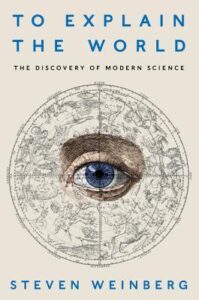 To Explain the World, Steven Weinberg
To Explain the World, Steven Weinberg
This book is ostensibly about the development of science, and particularly the scientific method: the development, in short, of the understanding that we need both theory and experiment to derive natural laws. It goes into a lot of the history of the development of astronomy and physics, and thus necessarily chemistry to some degree as well (since the makeup of an atom affects chemistry)… but neglects biology almost entirely. Since biology is my interest, I’d hoped for a bit more of it, but instead it was more or less including as an afterthought.
Weinberg’s tone is entertaining enough, and he certainly isn’t constrained by anyone else’s ideas of who truly contributed to science — he dismisses most of the ideas of Plato and Aristotle, even within the context of their time, because they didn’t conceive of the scientific method or how to come up with testable theories and follow through. You may or may not find that justified; I was glad, personally, that we didn’t spend too much time on Plato, as I’m not an enormous fan.
There’s a lot of science in here as well, in that Weinberg explains how discoveries were made and proven, or why they weren’t actually consistent with the world and what you can observe. Most of this is very clear, but anything that involves maths is sadly lost on me, and I confess to skipping the back section. There’s a reason my BSc in Natural Sciences is almost all biology — I have neither the head for, nor the interest in, mathematical rules and proofs.
It’s entertaining enough, but it’s narrower than the blurb might lead you to think — the vast majority of it actually deals with astronomy and maths.

Are there unnatural sciences?! “Natural sciences” is like saying, “natural natural philosophy,” i.e. tautological.
I’m not sure why it’s specifically “natural” sciences, but that’s what it’s called!
I wonder if they really mean, biological sciences?
Nope, physics is an option in the course too. (Not for me, I’ve specialised too much already, but for some people.)
Methinks, verily, they know not English…